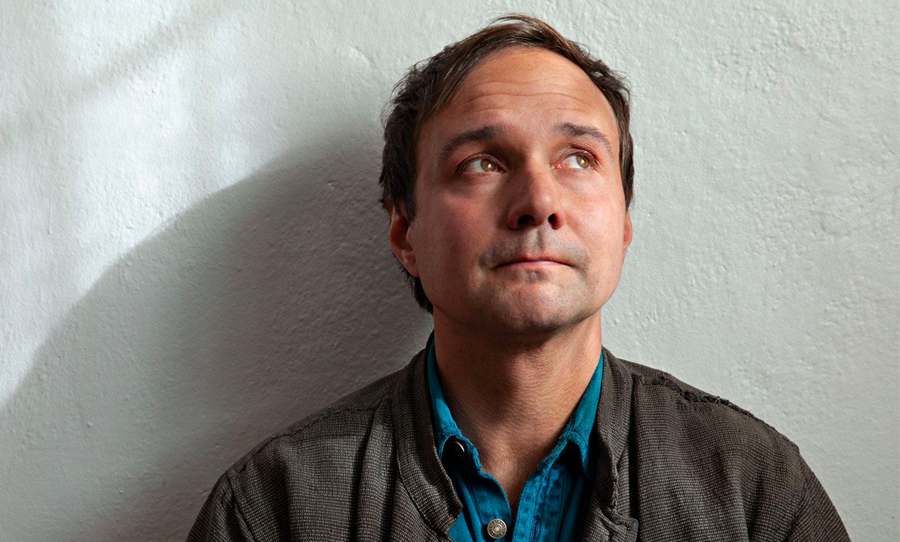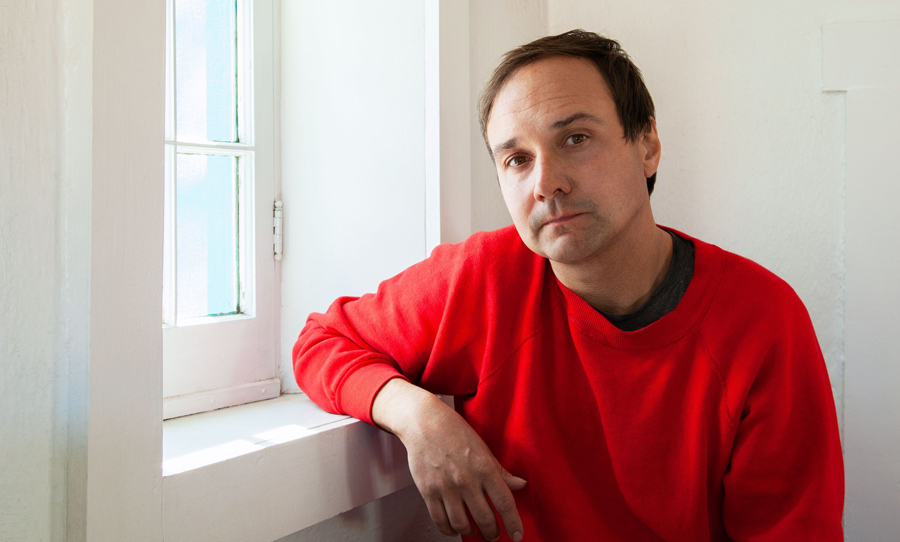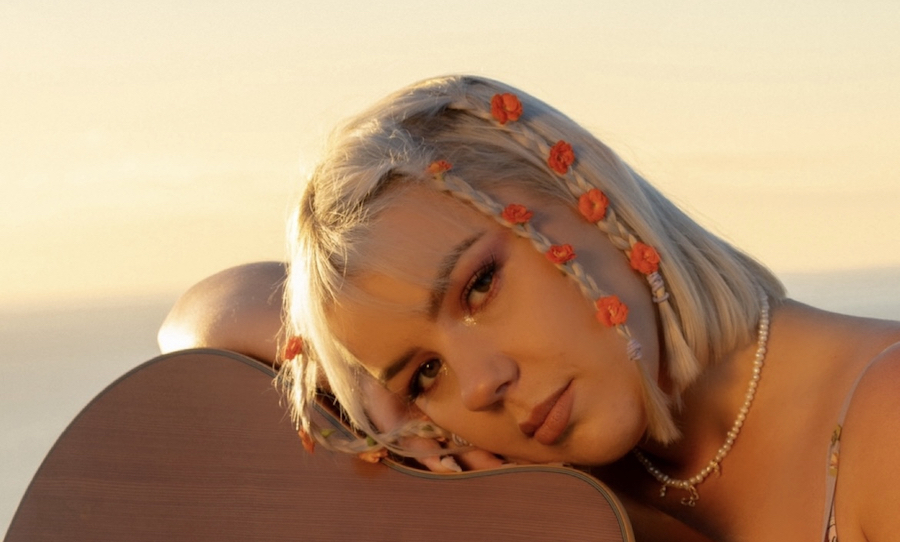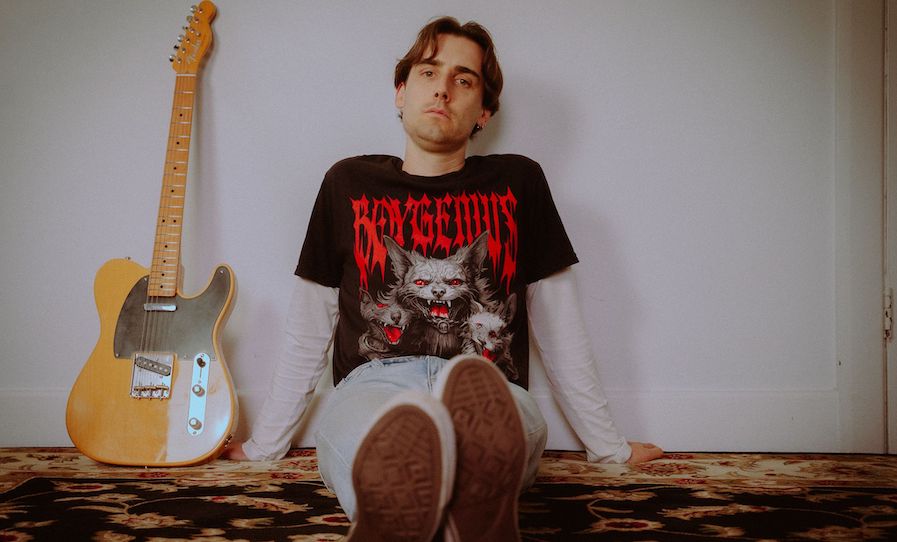After relocating to the remote Southwest of the U.S., Daniel Rossen has reemerged with You Belong There: a solo record of ambitious scope and brimming with intense honesty.
As part of Grizzly Bear, the compositions of Daniel Rossen helped to redraw the boundaries of indie rock. The palette was familiar (guitars, bass, drums, vocals), yet the musical vernacular went in thrilling new directions, bringing new colours and energy to a familiar form.
Now working solo and living with his young family in Santa Fe, New Mexico, Rossen’s new album, You Belong There (out April 8), is infused with his inimitable style. What’s more, he built this record — which is teeming with complex arrangements, rich in vocal harmonies, and alive with rhythmic interplay — almost entirely alone in what he calls a “janky little home studio”.
We chatted about working far off the beaten track and being inspired by it, learning new instruments out of necessity, and the musical influences on You Belong There — that range from classical, jazz, Brazilian, and beyond.

HAPPY: In the era leading up to this record, you moved from Brooklyn to upstate New York, and finally to Santa Fe. Do you think these dramatic contrasts in landscape are reflected in the personality of You Belong There?
DANIEL: I first moved out of the city in 2013 and then I lived in a very remote place for a few years. A lot of this record deals with that time, specifically. New Mexico does make an appearance, but a smaller one than upstate New York. A lot of the music I make has a tendency to relate to the place that I’m in. Painting a picture of the place that I’m in has always been a part of it; building those little worlds.
HAPPY: As an artist, you also went through a personal process of deconstruction then reconstruction. You went solo, but you picked up some new instruments and learned new things to rebuild your intricate sound in a new way. What’s it like to create music of this density almost entirely alone?
DANIEL: It’s pretty relatable to how I’ve worked in the past. I obviously don’t have the band to work with and bounce ideas off of, but I’ve always been a tinkerer. I picked cello a long time ago and I picked up drums when I did my EP ten years ago. I’ve always enjoyed exploring new instruments and picking up new skills if I can.
I had actually planned on going to Los Angeles and booking a bunch of studio time and working with a bunch of string and horn players. But that plan was made for around April of 2020. Then, of course, everything fell apart. So I had to recalibrate and make a whole new plan for what I was doing.
It led me to explore woodwinds and I also picked up an upright bass. Basically, I just expanded the palette of sounds I had at my disposal. It was a fun challenge and a nice aspect of making the record. I had to make all the choices myself — and I enjoyed that — but it was confusing at times.
HAPPY: I’d imagine that there would be a lot of planning too. The parts sound very intentionally orchestrated.
DANIEL: Often arranging parts in a band context can be an intuitive thing. You have plans and you see which ones work and which ones don’t. It was a similar process in this case except I played most of the instruments. I was also recording it myself for the most part — so I would set up a microphone, then walk over to the cello and play. It’s hard to keep a good workflow going when you’re doing that. There was a lot more ruminating and questioning what I was doing.
HAPPY: That process could lead to different outcomes as well.
DANIEL: I think so. This is definitely a record that’s very much in my own head, for better or worse. I think I had to do it, to get to whatever the next thing will be. I went all the way down the rabbit hole with my own process.
There was a lot of getting over my own self-criticism. I’ve been finding it difficult to finish anything in the last few years. But in some ways, the pandemic kicked me into high gear and I started working hard. When you’re at home with a toddler all the time, you’ve got to find these little pockets of time to work and focus on yourself. That was a challenge, so when I could find that time, I had to seize the moment and make something of it. Whereas in the years before Covid, it was much easier to just drift off and not finish anything.
HAPPY: Melody is so important across the album. I’m thinking of tracks like Unpeopled Space, in particular. Does that process of making a song like that begin with you honing just those fragments and using them as a launchpad for the rest of the layers?
DANIEL: A few of the tunes came from working through these fluid forms on the guitar — like Unpeopled Space, Shadow in the Frame, It’s a Passage, and I’ll Wait for Your Visit. A few came about like that — where it was a fluid form that I could execute in one piece. Then it’s a matter of piling on the arrangement and then paring it back to find its essence.

HAPPY: Stylistically, the album is so thrilling and ambitious. You can hear influences from the classical guitar repertoire in Shadow in the Frame, also some avant-garde 20th-century influences in Tangle. Were you listening to anything in particular during the making of the record?
DANIEL: I was definitely thinking about the music I loved when I was very young, which was a lot of classical and jazz. I was a big listener of Shostakovich when I was young, but that would be a lot more advanced than anything I could ever do (laughs)!
Often, I felt it was a meeting of Brazilian music that love, like Chico Buarque, or Baden Powell — meeting with the Soviet harmonies of Shostakovich. I’ve always been a lover of mid-20th-century music, as well as the film music of that period. I’m always thinking of that stuff, but on this record, I dug in a lot deeper into those influences.
I loved the idea of pursuing the craft, rather than trying to hide it. I was trying to find the soul and meaning within the more technical craft. Especially in modern pop music, those things can be pitted against each other. If there’s a display of technical ability, it can come off as jokey showmanship. I can enjoy that too, but I like the idea of laying into my own ability more. A lot of my favourite records are like that. Classic jazz records are like that: you don’t necessarily think of the person playing it as a great technical player, but often a great Nina Simone record is really technical.
HAPPY: That said, the vocal melody and the intimacy of lyrics really anchor the songs and draw you into the story. Was there are unifying concept behind the stories you wanted to tell on You Belong There?
DANIEL: Only in as much as I was trying to be really honest with myself. For the most part, the songs deal with my relationship to place and the natural world, and what it means to live in a very remote place and what that does to your brain. Also the very vague spiritual connection to these places; I’m not a religious person, but I definitely found that to be part of my experience. I think that’s a big thread throughout the record.
There are also tracks like Celia and I’ll Wait for You Visit that address my own family and my personal history within that context. That was something I was thinking about and dealing with when I was making the record. Also, the relationship with my child and the way my life has changed since becoming a parent.
I don’t really think of myself as a lyricist. It’s not something I’ve ever excelled in, but the best songs I’ve been able to write are just really direct and honest with myself.
HAPPY: I really love the sound of the record. Stretching back to the Grizzly Bear days, your tone has an unmistakable earthiness and you can really hear the sound of the room around the instruments — but there are some ethereal elements too, like spacey sounds of Keeper and Kin, for example. Can you tell me a bit about the sessions? Where did you record? And who was involved?
DANIEL: Mostly, I recorded it myself. Some of it was recorded upstate and the majority of it was recorded in my janky little home studio in Santa Fe with a couple of microphones. All of Chris Bear’s drum parts were recorded in a studio in Los Angeles. I went out there toward the end of the process and he’s on nine out of the ten tracks on the record. I also did some of the vocals there too. But mainly, they weren’t the most glamorous recording sessions.
HAPPY: But I think it ties into what you were saying about honesty. You’ve got these complex arrangements, but they’re underpinned by a direct recording style that really puts you “in the room” with the record.
DANIEL: I don’t have much to work with, but I was definitely trying to avoid overcomplicating things. Even effects. I have an old spring reverb unit, but I don’t have any fancy tricks going on. Some compression and reverb. But a lot of the time, without reverb. It was all done in a small room and that’s what it sounds like. But I like that aesthetic anyway. A lot of classic records are built that way: in dead, small rooms.
HAPPY: And what next for the rollout of You Belong There? Are you planning on taking it on the road? It would make for a pretty intense live experience.
DANIEL: I’m doing some shows in the States and Europe if I can get there. But to start with, I’m going to be doing solo shows. This record is hard to do that way — I can probably play about half of them competently by myself, in a way that feels like it’s communicating the song. I really like the intimate experience of doing a solo show. It’s a way of connecting with an audience that I never got a chance to when I was in a band. But if things go well and I can put a band together, I’ll do it. I would like that to happen, and if that does, I can come to Australia.
You Belong There is out on April 8 on Warp Records via Inertia Music.
Interview by Dan Shaw.



